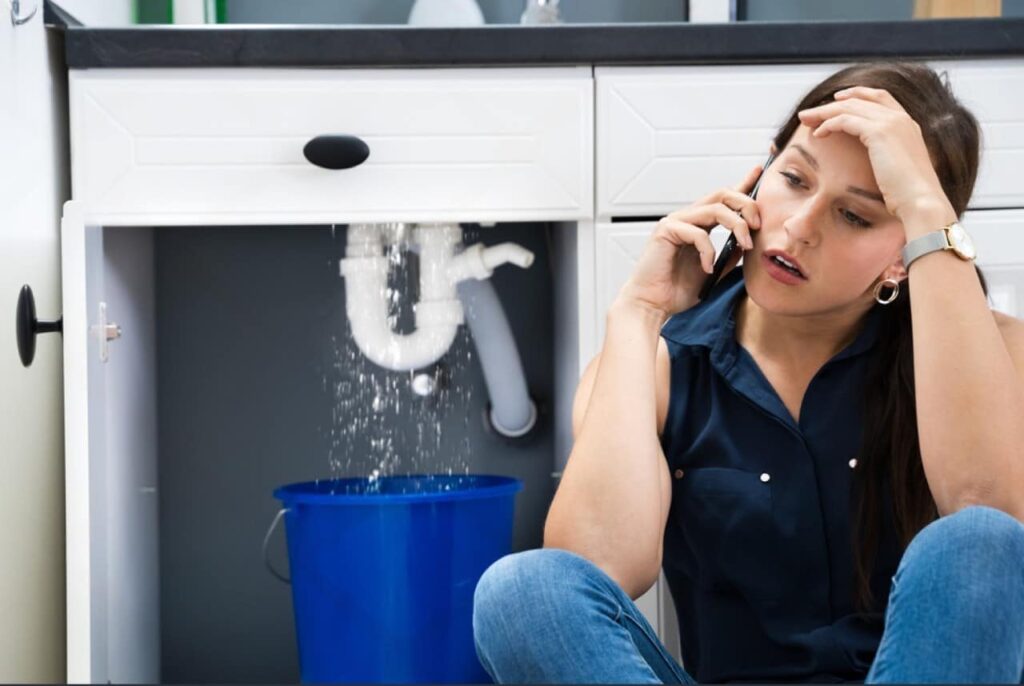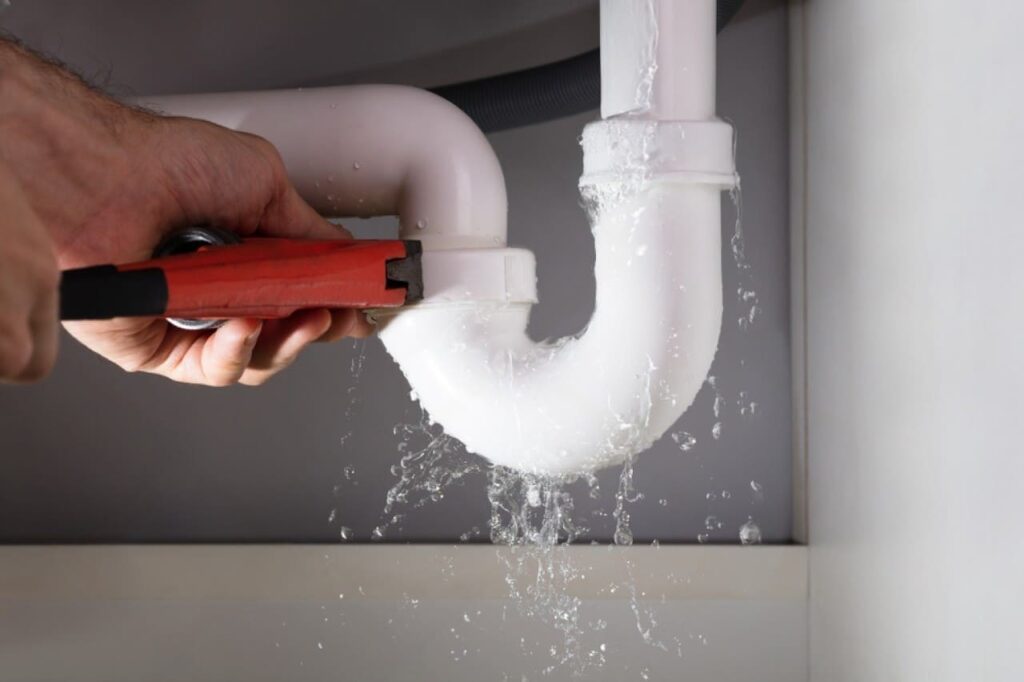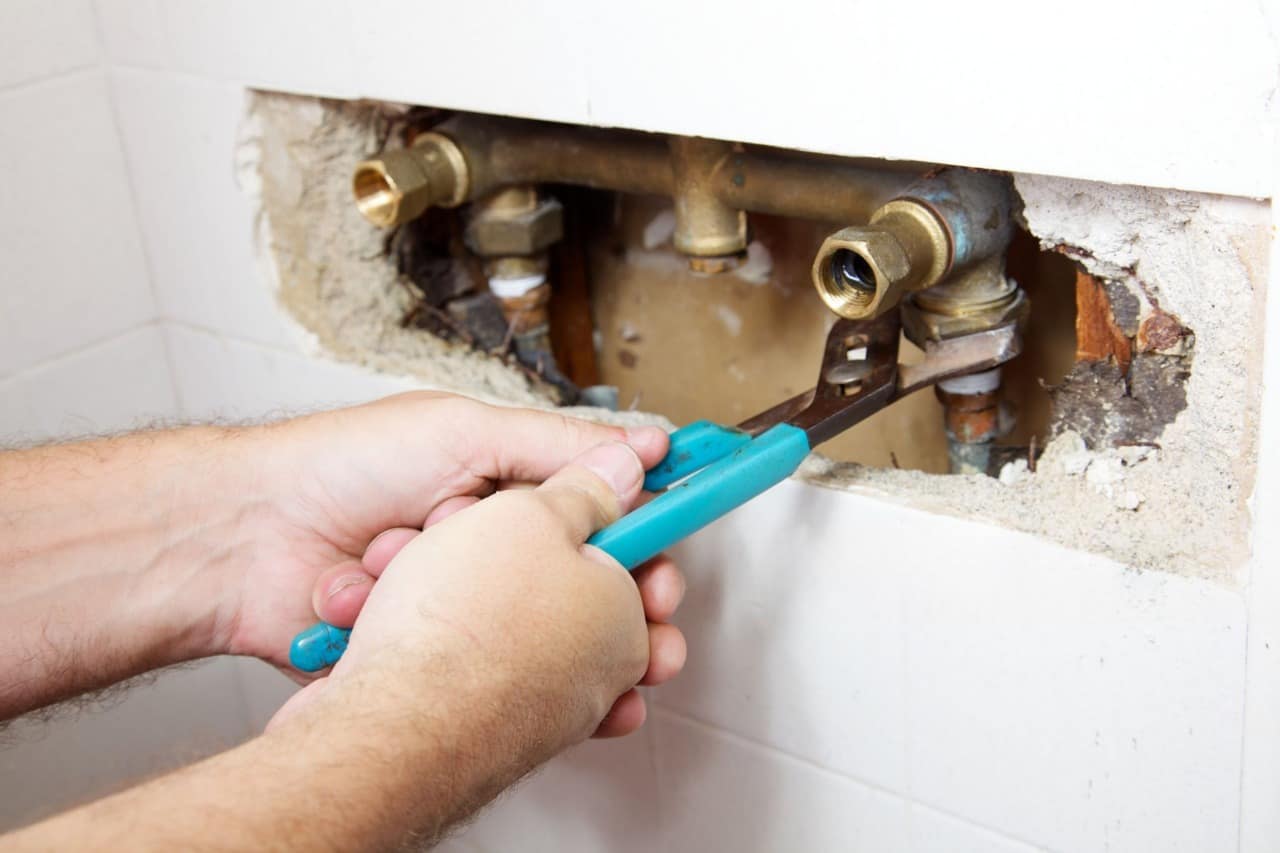The Urgency of Addressing a Leaking Pipe
When you find a leak in your home, time matters. A small water leak can quickly turn into expensive repairs and major water damage. Every homeowner needs to know how to find leaks early and take action fast.
Why Early Detection Saves Money and Prevents Major Damage
Hidden leaks can waste much water and drive up your water bill. Worse, leaks can lead to mold growth and damage your home’s structure. A slow leak might seem harmless, but it can cause thousands of dollars in damage over time.
An Overview of What Homeowners Will Learn in This Guide
This guide covers everything about pipe leak repair. You’ll learn how to find a leak, when to contact a professional plumber and how to prevent further damage. We’ll also discuss leak repair services and what to expect from costs.
Signs of a Leaking Pipe: How to Detect Problems Early
Visible Signs of Water Damage
Look for these clear signs of a water pipe leak:
- Water stains on walls, ceilings and floors
- Puddles or wet spots around pipes
- Peeling or bubbling paint and wallpaper
Hidden Leak Indicators
Some leaks hide behind walls or under slabs. Watch for these warning signs:
- Higher water bill without using more water
- Sound of running water when all faucets are off
- Musty smells and mold growth
Check your water meter when no water is running. If it still moves, you suspect a leak somewhere in your plumbing system.
Advanced Pipe Leak Detection Methods
Professional leak detection and repair services use special tools like thermal cameras and listening devices. These help find the location of the leak without tearing up walls or floors. Contact a professional for leak detection and repair when you can’t find the source.
What Causes Pipe Leaks: Understanding the Root Problems
Age, Wear and Natural Deterioration
Old pipes break down over time. Most water pipes last 20-50 years, depending on the material. Regular maintenance services can help extend pipe life.
High Water Pressure and Sudden Pressure Changes
Too much water pressure stresses your plumbing system. This can cause joints to fail and pipes to burst. Consider installing water pressure regulator services to protect your pipes from excessive pressure.
Extreme Temperature Changes (Freezing and Thawing)
Cold weather can freeze water inside pipes. When ice expands, it cracks the pipe. This often happens to pipes in basements, crawl spaces and outside walls.
Corrosion and Chemical Damage
Some water contains chemicals that eat away at pipes. This is common with older galvanized steel pipes that rust from the inside out.
Common Pipe Materials That Leak and Their Vulnerabilities
| Pipe Type | Common Problems | Typical Lifespan |
|---|---|---|
| Copper | Corrosion, pinhole leaks | 50-70 years |
| PVC Pipes | Joint failures, cracking | 25-40 years |
| Galvanized Steel | Rust, internal corrosion | 15-20 years |
| PEX | Fitting and connection issues | 40-50 years |
Each material has different weak spots. A plumbing expert can tell you which pipes in your home might need attention.
Emergency Pipe Leak Repair: Immediate Steps to Take

Step 1: Shut Off the Main Water Supply
First, turn off the water supply to stop more water damage. Find your main shut-off valve, usually near the water meter or where the water line enters your house. For small leaks at one fixture, you might only need to shut off that valve.
Step 2: Check and Document the Damage
Stay safe around electrical outlets and wet areas. Take photos of the damage for insurance claims. Look for signs of sewer gas or other hazards.
Step 3: Apply a Temporary Pipe Leak Fix
For emergency plumbing situations, try these quick fixes:
- Pipe repair clamps for small holes
- Rubber patches with hose clamps
- Epoxy putty for tiny cracks
Keep in mind, these are temporary solutions. You still need professional pipe repair services for a permanent fix.
DIY Pipe Leak Repair Tips: What Homeowners Can Handle
Basic Tools and Materials for Your Repair Kit
Keep these items handy:
- Pipe repair clamps
- Epoxy putty
- Rubber patches
- Hose clamps
- Pipe wrench
- Teflon tape
How to Fix a Leaking Pipe Joint by Tightening Fittings
Sometimes a loose fitting causes the leak. Use a pipe wrench to gently tighten the connection. Don’t over-tighten, as this can crack the fitting.
How to Fix a Small Hole with Epoxy and Patches
For tiny holes:
- Clean and dry the area around the leak
- Apply epoxy putty over the hole
- Cover with a rubber patch
- Secure with a hose clamp
The Limits of DIY: When to Stop and Call a Professional
Contact a professional plumber when:
- The leak is behind walls or under a slab
- You smell sewer gas
- Multiple fixtures have plumbing problems
- The water heater is leaking
- You’re not comfortable doing the work
Professional Pipe Leak Repair: When to Call the Experts

How Plumbers Fix Leaking Pipes with Advanced Techniques
Professional plumbers have special tools and training. They can handle complex plumbing issues like slab leak repair and water heater installation and repair. A good service provider will explain the problem and give you options.
Handling Complex Scenarios: Behind Wall and Slab Leaks
Slab leaks happen under concrete floors. These need special equipment to locate and fix. A plumbing and rooter technician can handle these tough jobs without destroying your floors.
The Professional Response to a Pipe Burst Repair
When pipes burst, you need emergency plumbing help right away. Professional pipe installation and repair services can stop the water flow and replace damaged sections quickly.
Pipe Leak Repair Cost: What to Expect
Key Factors Affecting Repair Costs
Costs depend on:
- Location of the leak (easy access vs. behind walls)
- Type of pipe material
- Amount of water damage
- Time of day (emergency calls cost more)
Average Cost Ranges for Common Repairs
| Repair Type | Cost Range |
|---|---|
| Simple joint tightening | $75-150 |
| Small pipe patch | $150-300 |
| Pipe section replacement | $300-800 |
| Slab leak repair | $1,000-4,000 |
| Water heater replacement | $1,200-3,000 |
Understanding Homeowners’ Insurance Coverage
Most insurance covers sudden water damage but not gradual leaks. Check your policy and document everything if you’re experiencing a water leak.
Preventing Future Pipe Leaks: Maintenance and Best Practices
The Need for a Regular Inspection Schedule
Have your plumbing system checked yearly. Look for signs of wear around the water heater, toilet and other fixtures. Early detection prevents major plumbing problems.
Water Pressure Management and Regulation
Keep water pressure between 40-60 PSI. High pressure stresses pipes and can cause leaks. Install a pressure regulator if needed.
Winterization and Pipe Insulation to Prevent Freezing
Protect pipes in cold areas with insulation. Drain outdoor faucets and sprinkler systems before winter. Professional winterization services can help prepare your plumbing for cold weather and prevent freeze damage.
Summary: Protect Your Home with Prompt and Professional Repair
Recap of Key Takeaways for Homeowners
Keep these important points in mind:
- Check for leaks regularly
- Act fast when you find problems
- Know when to call for help
- Keep emergency supplies ready
The Need for Prompt Action
Quick action prevents costly repairs and protects your home from water damage. Don’t wait if you suspect a leak preventing water damage is always cheaper than fixing it later.
Your Trusted Partner for Pipe Leak Repair in Los Angeles
When you need reliable water leak repair services, choose experienced plumbing experts. The best plumbing companies offer 24/7 emergency service and guarantee their work. For all your plumbing needs in the Los Angeles area, contact a professional who understands local plumbing issues.
Frequently Asked Questions (FAQs) About Pipe Leak Repair
Q: How quickly should I address a pipe leak?
A: Fix leaks immediately. Even small leaks can cause major damage and waste water.
Q: Can I temporarily fix a leaking water pipe myself?
A: Yes, but only as a temporary solution. Use pipe clamps or epoxy for emergencies, then call a plumber.
Q: How much does professional pipe leak repair cost?
A: Simple repairs cost $75-300. Complex jobs like slab leaks can cost $1,000-4,000.
Q: How do I know if a pipe leak is behind my wall?
A: Look for water stains, mold or higher water bills. Professional leak detection can find hidden leaks.
Q: What’s the difference between a minor leak and a pipe burst?
A: Minor leaks drip slowly. Pipe bursts release lots of water quickly and need emergency plumbing help.
Q: Will my homeowner’s insurance cover pipe leak damage?
A: Usually yes for sudden leaks, but not gradual damage. Check your policy details.
Q: Should I replace the water pipe or just repair it?
A: Depends on the pipe’s age and condition. Your plumber can advise the best option.
Q: How can I prevent pipe leaks in the future?
A: Regular inspections, proper water pressure and winterizing pipes help prevent leaks.
Q: When is a pipe leak considered an emergency?
A: When there’s lots of leaking water, sewer backup or risk of electrical danger. Call emergency plumbing services right away.







